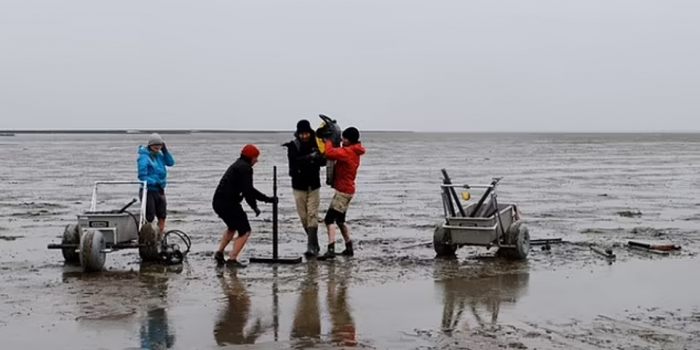Archaeologists have achieved a groundbreaking feat by uncovering the long-lost city of Rungholt for the first time.
The fabled city, believed to have been swallowed by the North Sea in a single night due to the sins of its inhabitants, has remained a subject of myth and speculation. However, recent research has unveiled the remains of this “Atlantis of the North Sea” in the Wadden Sea, providing valuable insights into the history of the region.
According to Science Alert, the legend surrounding Rungholt described it as a prosperous city that met its demise in one night after a fierce storm. The locals believed that the city’s destruction was a punishment for the sins committed by its residents, including flaunting wealth, impiety, and drunkenness, as noted by The Times. A local legend even suggests that the bells of Rungholt’s tower can still be heard echoing from the depths of the North Sea.

Graphic courtesy: The Daily Mail
For over fifty years, scholars have speculated about the existence of Rungholt. Some considered it to be a mythical or fictional settlement akin to the famous Atlantis. However, a recent study led by archaeologists from Christian-Albrecht University has successfully unearthed the remains of the city. Through extensive geophysical surveys, the researchers discovered approximately 1.2 miles of prehistoric mounds surrounding an island called Südfall, as reported by MailOnline.

The discovery of Rungholt comes after 660 years since its demise in 1362. The city was once a significant trading hub in North Frisia, a historically important region in northern Germany. Geophysicist Dennis Wilen from Kiel University explained in a press release that advanced techniques such as seismicity, electromagnetic induction, and magnetic gradiometry were utilized to locate and map the hidden remnants of the city buried beneath mudflats.
Among the findings are the foundations of a large church, drainage systems, and a harbor. These discoveries shed light on the lives of the prehistoric North Frisian people and offer valuable insights into the history of the region. However, the researchers face a race against time as the surrounding conditions pose a threat to the preservation of the city’s remains.

Hanna Hadler from Mainz University’s Institute of Geography emphasized the urgent need for further research and preservation due to the remnants’ heavily eroded state, which often exists as “negative imprints.”
Although the recent discovery took place only four weeks ago and the full extent of the remains is yet to be determined, it marks a significant milestone in unraveling the mysteries of Rungholt. The findings open new avenues for exploring and understanding the lost city, providing a tangible connection to a bygone era.


